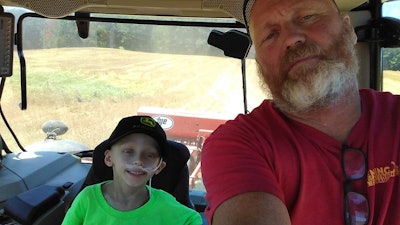
Editor’s Note:
This is part of Equipment World's in-depth series that explores the troubling state of mental health in the construction industry and what can be done about it.
Also in this series: Why the Industry's Suicide Rate So High?
Roger Wenning had always been able to handle whatever life threw at him, and mental health was not something he talked or thought about much.
He’s the owner of Wenning Excavating and Drainage in Greensburg, Indiana, and a lifelong farmer. Both occupations give him a lot of time to himself, independence and loads of responsibility.
“You're a tough guy,” he says. “You don't have problems. You do your work on your own. You don’t need help.
“And that's what I believed.”
That all changed five years ago. His grandson Travis lost his 10-month battle with cancer. He was only 6 years old.
“We were awful close,” Wenning says. “He loved farming, the excavating stuff.
“It tore me up.”
You can hear the nervousness and sadness in his voice as he speaks about it. He first opened up publicly about his struggles with depression following Travis’ death last spring. He was really nervous then, too, he says, but it’s getting a little easier. He powers through the nerves because he wants others to know that mental health problems – in his case, depression – need to be treated and are nothing to be ashamed of.
“That's what I want people to know. I don't want them to feel sorry for me or nothing like that. I I want them to get help, and I want them to heal.”
“Suck It Up”
Wenning, who is 65, thought he could handle the grief, but his friends noticed a change that he was unaware of.
“It wasn't that I was suicidal, but I had just lost most feeling and care,” he says.
He couldn’t eat. He couldn’t sleep.
“I was told by somebody that I was close to, ‘Well, you just got to suck it up and deal with it.’
“I can tell you now, and all the experts are going to tell you, ‘No, that's not the way you handle it.’
“But I tried that. I went on for probably a year and a half and just let it eat me up.”
Good friends, some of whom had struggled with mental health, would keep calling to check in on him and urge him to seek help.
“That was the only thing that kept me going,” he says.
He resisted, but his friends’ persistence eventually led him to change his mind.
He went to see a doctor.
“I had a very caring doctor,” Wenning says. “He asked a lot of questions.
“They finally convinced me I needed to go see a therapist.”
Learning to Cope
Wenning was diagnosed with severe depression brought on by extreme grief, he says.
In therapy, Wenning learned a variety of coping methods. Those included listening to soothing music, shifting thoughts to happier places and picking up the phone, which seemed to weigh a thousand pounds, to call friends.
It was also suggested he take an anti-depressant.
“I fought that hard at first,” he says. “I had all these misconceptions.”
While taking the prescribed dosage, he noticed that he was sleeping better.
“I just started seeing life a little clearer.”
Speaking Out
Wenning’s faith in God took a big hit. He stopped praying every night and going to church each week as he had before. He believes that also hindered his recovery, and he has returned to regular church attendance with his family.
“I still deal with some issues with God about this, but I’m working on it.”
Wenning still grieves the loss of Travis and struggles at times. But he’s decided to speak out about his experience in the hopes of helping others in construction and farming.
“It's a major hindrance,” he says of the tough-guy image often prevalent in construction and farming. “It's just the way we were brought up. You’re this manly tough guy that can do anything, solve anything, and you don't need help because you can do it.
“Well, guess what, sometimes we get weak. I don’t like to admit it. I didn’t want to, but it happens.
“But I want other people to know that they need to get help for this.”
Contractors’ Stories of Hope
To read other accounts of contractors who have overcome mental health challenges, check out our stories below.
- Contractor Recounts Suicide Attempt to Help Others
- Equipment Operator Shares Story of Addiction Recovery
- Therapy Helps Contractor Overcome Military PTSD
Also in this series:
- Part One: Why is the Industry's Suicide Rate So High?
- Part Two: Contractor Recounts Suicide Attempt to Help Others
- Part Three: Ajax President Speaks Out to Prevent Suicide
- Part Four: Contractor Starts Company Mental Health Program
Help is Available
If you are experiencing a suicidal crisis or mental health-related distress, call or text “988” to connect to the 988 Suicide and Crisis Lifeline, a national network of more than 200 crisis centers providing 24/7 confidential support from mental health professionals.
Veterans can press "1" after dialing 988 to connect directly to the Veterans Crisis Lifeline, which also serves active service members, National Guard and Reserve members, and those who support them. For texts, veterans should text the Veterans Crisis Lifeline short code: 838255.











